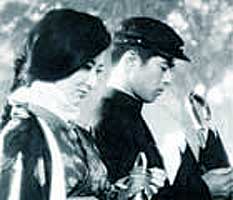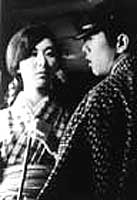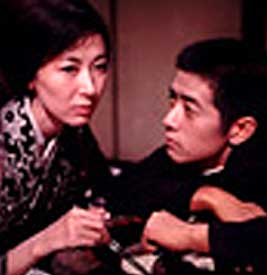 Hiroshi Kawaguchi plays Hekiro, a troublemaker in the Taisho era, whose step-mother (Kinuyo Tanaka) is an invalid unable to take good care of him, & whose father (Masayuki Mori) remains distant & detached by hiding away in his studies.
Hiroshi Kawaguchi plays Hekiro, a troublemaker in the Taisho era, whose step-mother (Kinuyo Tanaka) is an invalid unable to take good care of him, & whose father (Masayuki Mori) remains distant & detached by hiding away in his studies.
Ototo (Her Brother, 1960) is based on an autobiographical novel by Aya Koda, the father is based on the Japanese novelist Rohan.
Hekiro's sister Gen (Keiko Kishi) is based on Aya Koda. She's a stand-in parent who protects Hekiro to the point that she fascilitates his delinquency without meaning to.
 A work of melodrama, it manages not to seem florid or overwrought, but to be about actual people whose emotions run to just such strength. A work of melodrama, it manages not to seem florid or overwrought, but to be about actual people whose emotions run to just such strength.
By force of Kawaguchi's (& all the cast really) acting ability, the potentially over-the-top death scene from tuberculosis, when Hekiro finally repents of his bad behavior, is rendered beautiful in its deep sadness, rather than mere melodramatic success.
Shot in Daiei Studio's "Afgacolor," Ototo has a muted look like a vintage postcard, extremely beautiful. This was the first time anywhere in the world that the experimental process, now called "skip-bleaching," was ever used.
Cinematographer Kazuo Miyagawa won the Mainichi Award & Blue Ribbon Award that year, while the director picked up a "technical grand prize" at Cannes essentially for the photographic method.
Ototo received numerous best film awards for Kon Ichikawa including the Kinema Junpo, Mainichi, & Blue Ribbon awards. There were also several performer awards. It's startling that the film has fallen into relative obscurity in the west, though subtitled prints exist & it the film is occasionally shown on university campuses & in retrospects of director Kon Ichikawa.
copyright © by Paghat the Ratgirl
|

